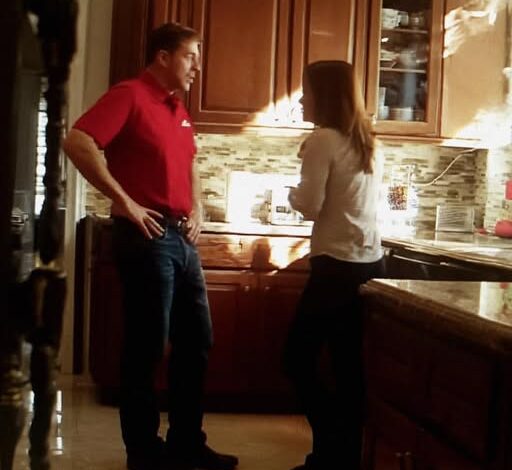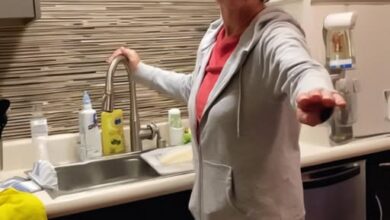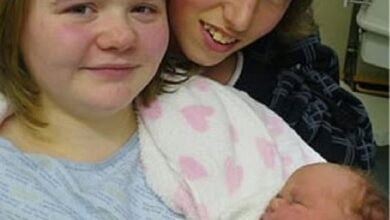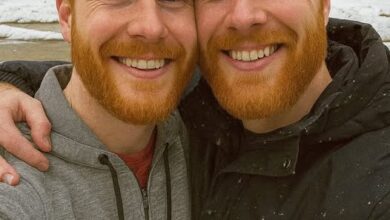
My Husband Refused to Help Pay My Mom’s Medical Bills – Now He Demands Her Inheritance
Sam once promised I’d never have to worry about anything again. Turns out, he meant everything—except my mother.
I didn’t picture my thirties this way: standing in a spotless living room I cleaned myself, listening to my husband’s family tell me what I “owed,” while he scrolled on his phone like a bored hotel guest. I used to be a marketing executive with a keycard that opened glass doors and a calendar packed with launches. Four years ago, after our son, Lucas, was born, I stepped back. It wasn’t an easy decision, but Sam insisted.
“Your only job now is raising our son,” he’d said, kissing my forehead. “Let me take care of everything else.”
He took care of the bills. I took care of everything else—the appointments, the lunches, the midnight fevers, the mental spreadsheet of our lives. It felt like a team until the day it didn’t.
Nine months ago my mother’s health slipped. Diabetes, always loud in the background, suddenly grabbed the mic. New meds, more testing, devices that insurance “partially covered,” as if the other part could be made up with goodwill. My younger brother, Jeremy, and I built a spreadsheet at her kitchen table.
“We can split it,” he said, tapping numbers. “It’ll be tight, but I’ll make it work.”
“I’ll talk to Sam,” I said. “Even half would help.”
That night Lucas lay on the rug kicking along to a cartoon theme song while Sam flicked his thumb over a feed of other people’s lives.
“Mom’s treatments are getting expensive,” I began. “The new medication isn’t covered. Could we help with half? Even a few hundred a month—”
“She’s your mom,” he said, not looking up. “Not mine.”
I waited for the laugh, the I’m kidding. It didn’t come.
“She stayed when Lucas was born,” I reminded him. “Cooked, cleaned, did night shifts. She’s part of this family.”
“Sorry,” he said, eyes still on the blue glow. “Not my responsibility.”
Something cracked clean through me. I tried again, voice steady only because it had to be. “Please, Sam. I’m not asking for all of it.”
He finally met my eyes. “I said no. You and Jeremy can handle it. Isn’t that what siblings are for?”
I cried in the bathroom that night with a towel pressed over my mouth so Lucas wouldn’t hear. Jeremy covered everything. He sold his guitar, delayed a move for a better job, told me not to worry. He never complained. Not once.
When Mom died last month, the church smelled like lilies and lemon cleaner. Jeremy held my hand so hard it hurt. Sam stood near the back talking to an uncle about index funds. I stared at the casket and felt something bitter and bright take root in me: a certainty that I was married to a man who turned away from need unless there was a receipt.
Two weeks later the inheritance appeared like a plot twist none of us saw coming. Mom had held on to four old houses on the edge of town—sun-faded porches, flaking trim, weeds as high as a child’s knee. Not valuable on their faces, but maps of possibility if you knew how to read them. The lawyer slid envelopes across a polished table and told us we’d split them. Jeremy’s mouth opened and closed. Mine did, too.
When I told Sam, he put his fork down mid-bite for the first time in months.
“So,” he said, grinning. “When are you selling your half of that old nonsense? I could finally get a new car. Or we could do Bali like you wanted.”
“Excuse me?”
“You’re not working,” he said, laughing like it was all so obvious. “This is your chance to give back. I’ve covered you for years.”
Give back. The words clung like something sticky. I scrubbed them off dishes later and they were still on my skin. Managing every second of our lives, giving up the office I loved, the nameplate on the door—that wasn’t giving?
Then the phone calls started. Rosie, my sister-in-law: “Do something nice for Sam. This is your chance to repay my brother for everything.” Charmaine, his mother: “Our roof is leaking. It would take pressure off Sam if you pitched in now.” Ian, his brother: “Surprise him with that upgrade. He deserves it.”
Deserves it. I didn’t argue. I wrote. I dragged the junk drawer open and found a notebook. Date, time, what they asked for, the word “owe” tally marks. I didn’t know what I’d use it for, just that I needed a record of the invisible things.
Three days later I invited them for tea. Lucas’s LEGO set was staged in a corner, muffins on a platter I usually reserved for birthdays. They arrived with bright, expectant faces. My heart thudded, but my voice didn’t shake.
“I’ll give you the money,” I said.
All four of them leaned in. Sam smiled, relieved. “Thanks, babe. You’re doing the right thing.”
“I’m not finished.” I looked at each of them. Ian’s keys chimed faintly in his pocket. Rosie smoothed a nonexistent wrinkle. Charmaine studied a framed drawing of a dinosaur as if it were fine art.
“I’ll give you my entire inheritance,” I said, “under one condition.”
Smiles tightened. The room held its breath.
“Tell me where you were,” I said, “when my mother needed help. When I begged for a few hundred dollars for her medication. When Jeremy drained his savings. When I was scheduling appointments between school pickups and still cooking dinner. Where were you?”
No one spoke.
“Explain how her money belongs to you. Explain the logic that makes my mother’s life’s work your home improvement budget, your car, your vacation. Make it make sense.”
Silence settled like a heavy comforter you can’t kick off. Sam stood, jaw working. “You think you can humiliate me in front of my family?”
“No,” I said, almost gently. “You did that when you refused to help the woman who bathed your son and folded your shirts while you slept. When you decided generosity is only generosity if you can post it.”
Rosie started, “Sam provides—”
“For what he likes,” I said. “For what looks good. He provides the bare minimum here and expects gratitude with a bow. Did he sit with me in waiting rooms? Did he ask Jeremy how he was holding up? Or was he busy asking what I was making for dinner?”
Charmaine lifted her chin. “We didn’t know how bad it was.”
“You didn’t ask,” I said. “Because it wasn’t your roof.”
Ian cleared his throat. “This is getting personal.”
“It is personal,” I said. “This is my life.”
I didn’t yell. I didn’t cry. I let the truth do the work. They left with murmured complaints about my tone. Sam went with them, face dark.
Jeremy brought Thai food that night. We ate on the floor while Lucas made a runway for toy cars with napkins. “You okay?” Jeremy asked.
“I think so.” I felt fragile and steel at the same time. “I needed to say it out loud.”
“Mom would’ve been proud,” he said. “She always said you walk toward the hard thing, not around it.”
The next morning I filed for divorce. Not to punish, not in spite—it felt like putting a house back on its foundation after years of leaning. I sold one of the properties, hired a handyman for what I couldn’t do, and turned the spare bedroom into an office with a secondhand desk and a plant that leaned toward the window. I emailed old clients, then new ones. I’m not conquering anything. I’m rebuilding.
Lucas and I moved into the smallest of Mom’s houses, the one with the porch that faced west. The first weekend, Jeremy and I pulled weeds until our backs ached and painted the living room the exact color of a cloud right before rain. We fixed up Mom’s rocking chair, sanded the arms she’d worn smooth, oiled the wood until it glowed. It sits on the porch now, facing the yard. Sometimes I drink tea there while Lucas runs barefoot in the grass and the world smells like cut clover.
Sam sees Lucas once a week. He still earns what he earns. He still scrolls. When he comes by, he stands on the porch and tells me I’m making things harder than they need to be. I hand him the diaper bag and a list of snack preferences and close the door.
On Thursdays, I take meetings at the library’s study room while Lucas builds towers in the children’s area. My new clients are small businesses and nonprofits who can’t afford an agency but deserve a brand that feels like theirs. I love listening to people talk about what they care about, translating it into a story that fits.
When money gets tight between invoices, I breathe and remind myself that uncertainty is a feeling, not a forecast. On difficult days, I pull the notebook from the drawer and read the tally marks. Not to nurse resentment, but to remember that I’m not imagining the weight I carried without being seen.
On Lucas’s fifth birthday, Jeremy grilled in the yard while Lucas tore through sprinklers with a paper crown sliding down his head. Sam arrived late with a drone he made a point of buying himself. “Big boys need big toys,” he said loudly, glancing at me. Lucas was thrilled for ten minutes, then abandoned the drone to dig in the mud with a spoon. There are metaphors you don’t have to force.
That night, after cake, I sat in the rocking chair and watched the sky turn the color of a bruise as the sun went down. I thought of Mom, of her hands on this chair, of the way she’d hum without realizing while she shelled peas. I thought of the four houses she left us, of how things that look like burdens can be bridges if you’re willing to cross them plank by plank.
A week later, Charmaine called. Her voice was careful. “I heard you filed.”
“I did.”
She cleared her throat. “I shouldn’t have asked for the roof. That wasn’t… right.”
“Thank you for saying that,” I said.
“Sam is… Sam,” she added, as if it were a diagnosis. “He’s always been.” A long pause. “I hope you’ll still bring Lucas by sometimes.”
“I will,” I said. “He should know all of his family. But we’re going to do it on terms that are good for him.”
After we hung up, I added a note in the back of the notebook where I’d been tracking debts everyone thought I owed: Apology received. Not owed—offered. It felt like clearing a small stone from a shoe.
The divorce moved at the speed of paperwork. On a morning with frost on the lawn, a judge stamped pages and said words that made me free. I didn’t cry until I got back to the car and realized I had expected to feel emptier than I did.
The marketing agency grew—word-of-mouth, then referrals. I hired a college kid part-time to help with social media and watched her teach me shortcuts I didn’t know. I bought a secondhand bike at a garage sale and a bell that makes Lucas laugh every time I ring it. We ride to the library on Saturdays. Sometimes we stop for ice cream if the budget says yes, and for sprinkles if the week has been long, regardless.
One afternoon Rosie texted to ask if we could talk. We met at a coffee shop where the menu board still had chalk smears from yesterday’s prices.
“I was out of line,” she said without preamble. “About what you ‘owed.’ It was gross. I’m sorry.”
I nodded. “Thank you.”
She twisted her ring. “Sam thinks you turned Lucas against him.”
“I don’t talk about Sam to Lucas,” I said. “But Lucas notices who shows up.”
She swallowed, then said something so quiet I had to lean in. “I think you saved yourself.”
On the porch that night, in the rocking chair, I let the words settle. Maybe I had. Maybe I saved Lucas, too, from learning that love is a ledger.
I still think about the moment in my living room with the tea and the muffins and their bright expectant faces. I think about the stillness before I spoke, the way it felt like standing at the edge of deep water. The inheritance didn’t buy my freedom. Choosing the hard thing did. The houses were just the stage; the act was mine.
There are evenings now when the house is quiet after bedtime and I walk through each room touching the edges of what we’ve built—fingerprints on the hallway, a water ring on the coffee table I haven’t sanded out yet, a line of Matchbox cars parked with great seriousness along the windowsill. I think of the woman who stood in her bathroom crying into a towel so her son wouldn’t hear. I want to tell her: you will not always feel like this. You will remember how to be proud of yourself.
Sometimes, when the late light slants across the porch, I pull Mom’s chair closer to the railing so I can see the whole yard. The grass isn’t perfect. There are bald patches where we tried to plant too much at once. But Lucas runs anyway, shrieking with delight when a dragonfly zigzags near him. Jeremy will show up with a toolbox and a joke. Clients will email with edits and we’ll meet deadlines and miss a few and learn and try again.
Sam will be Sam. He will show up on Fridays and learn what snacks work and which ones don’t, because it turns out fatherhood is less a role and more a practice. Maybe, eventually, he will understand that love is not a thing you buy, and generosity isn’t content. Maybe he won’t. That part isn’t my job anymore.
My job is here. It’s the boy with grass stains on his knees. It’s the porch that faces west. It’s the chair that creaks in time with my breath and the notebook in the drawer that I don’t need to open as often.
It’s the life I’m building, plank by plank, stubborn and steady, like someone taught me a long time ago.




